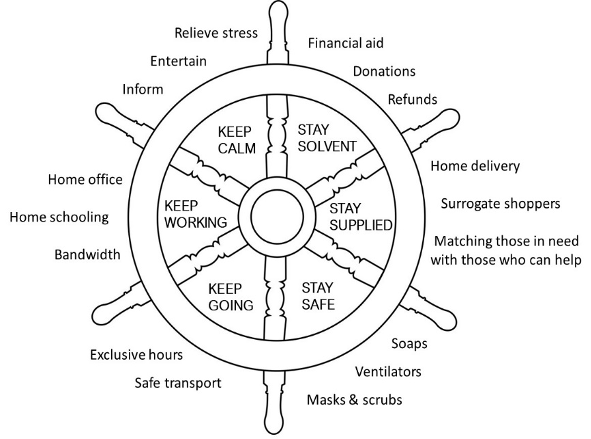
How Small and Big Changes Can Make a Cumulative Difference
By Steve Walls and Judith Walls
To date, some companies’ response to the COVID-19 pandemic has been to email their database, telling consumers and other stakeholders to “Stay Home, Stay Safe.” The default of these companies seems to be creating awareness of the need for social distancing rather than sharing practical, concrete actions that companies are taking to help navigate the storm of COVID-19.
And yet times of crisis are precisely when companies should step up and live up to their purpose statements — offering real commitment to social and environmental causes. This urgency holds especially for influential companies that are rich in resources.
Society is facing at least six challenges related to COVID-19. Our families and communities need to Keep Calm, Keep Working, Keep Going, Stay Solvent, Stay Supplied, and Stay Safe. Companies can help address each of these challenges, which are shown in the illustration below.

Help People Keep Calm Under Lockdown
Can companies help keep stress levels low? Could they provide entertainment to people? Fact check the stories spreading on social media? Or bring people together through interactive sessions aimed at exercising, blowing off steam, or just breathing deeper?
This could include streams of entertainment from artists who lack stages to perform on and have lost their income. Mental health apps could provide balance to off-kilter parents and kids during home schooling. Social media companies could also help people to find existing help groups or help these groups organize more effectively.

Help People Keep Working
By now, many people are using tools to connect virtually that they had not downloaded only a week or two ago. But many are also in crisis management mode, balancing life and work demands, and not making the most of digital tools. How can companies help the world make the switch to digital working and learning without an IT department at hand? Three areas need action:
IT support. Companies can increase the number of help lines and waive fees. Software companies can expand their assistance to competitors’ product offerings.
Home schooling. As of April 2, UNESCO reports that school closures affect nearly 90% of students worldwide. Many teachers had to invent digital activities literally overnight. Companies have provided free platforms for K-12 education, but there are more opportunities for teacher- and kid-friendly guides to connection online, or apps that help parents know what their kids are doing.
Data and bandwidth. Not everyone can afford the data demanded by this new way of operating, and companies can facilitate access. Loyalty points could be traded for data. Companies can offer locations for free WiFi. Bandwidth constraints are also growing as literally billions of people boot up their computers. Content companies could suspend their 4k streaming to relieve the strain on virtual networks.
Help Those on the Frontlines Keep Going
Many people put themselves in danger every day to look after the sick, provide for the well, and keep essential services going. Companies can offer them support in two ways:
Provide exclusive/extended hours and services. Supermarkets have offered extended or exclusive shopping hours to those working in essential services. Can other companies offer similar services, such as a helpline that front-line warriors get through to faster, banking services that stay open longer, and direct delivery to hospital carparks or staff rooms?
Safer commutes. Daily travel to and from work, especially on public transport, puts essential workers at risk. Companies can lower that risk. Personal mobility companies that produce e-bikes and e-scooters can offer them for commutes. Car rental companies could offer cheaper rental vehicles. Companies could offer basic personal protective equipment (PPE) to workers for their commute.
Help People Stay Solvent
The next mass wave coming in will be financial ruin, as economies nosedive, unemployment skyrockets, and savings run out. The implications of a 20% to 25% decline in economic output are dire. Can companies help people stay financially afloat while they weather the storm?
When possible, businesses could give people a temporary break in their cash crunch by providing refunds on lost holidays, waiving fees, offering payment holidays, and extending credit access. Small and medium enterprises, in particular, will suffer.
We hear about price gouging, but there’s a great opportunity for companies to make the basics as cheap as possible, e.g. with their own label brands. This action can help lower the cost of living in the tough times ahead.
Let’s strengthen the safety net. Financial support for NGOs dedicated to feeding the poor hasn’t really started to pour in, but these organizations will be flooded with demand. Supermarkets can offer them produce, and transport companies can help with logistics.
Help People Stay Supplied
Can companies ensure that the old and vulnerable isolated at home get food and medication? Business has the necessary skills in logistics, transport, and digital technology for connection. Companies can:
Connect neighbours. Many of us don’t know our neighbours or their needs. Yet news stories keep showing that people are willing to help if they know how, and some companies could help make these connections happen.
Connect differently with customers. Large sales forces suddenly find themselves with company cars and nowhere to go. Could they become the new delivery drivers?
Help People Stay Safe
Can companies provide the essentials to stop or slow the spread of COVID-19? Companies can ask: How much of our production can be switched to make essential items like soaps, masks and ventilators needed to help stop the spread of the virus? Should we abandon our key business lines temporarily?
This is the most obvious, immediate way that some companies can help, so it’s heartening to see those who can manufacture at scale stepping into the fray.
Provide Material Aid, Not Memes
The world needs help to navigate this crisis. Businesses are creative, powerful forces in our society. By addressing their skills to our shared challenge, they can close the gap between symbolic and substantive action and live up to their full purpose.
A version of this article was published by the Network for Business Sustainability, a growing network of more than 7,000 researchers and managers committed to advancing sustainable business. The article is part of an initiative by multiple academic networks focused on organizations and sustainability to provide research-based insights into COVID-19.
B the Change gathers and shares the voices from within the movement of people using business as a force for good and the community of Certified B Corporations. The opinions expressed do not necessarily reflect those of the nonprofit B Lab.

6 Ways Businesses Can Help Society Navigate COVID-19 was originally published in B The Change on Medium, where people are continuing the conversation by highlighting and responding to this story.